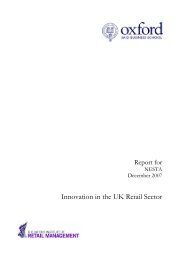Everyday innovation report - Nesta
Everyday innovation report - Nesta
Everyday innovation report - Nesta
You also want an ePaper? Increase the reach of your titles
YUMPU automatically turns print PDFs into web optimized ePapers that Google loves.
22<br />
Figure 2: People-relevant resources for <strong>innovation</strong> in organisations<br />
Development Factors<br />
Education<br />
Socio Economic Status<br />
Heritability<br />
Employee<br />
Cognition<br />
Cognitive Ability<br />
Cognitive Style<br />
Intellectual Engagement<br />
Personality<br />
Openness to Experience<br />
Tolerance of Ambiguity<br />
Energetic<br />
Social Rule Independence<br />
Emotional Stability<br />
Motivation<br />
Intrinsic motivation<br />
Proactivity<br />
Personal initiative<br />
Knowledge<br />
Domain-relevant<br />
Specific vs Broad<br />
Expertise<br />
Behaviors<br />
Communication<br />
Social Competence<br />
Networking<br />
Work Style<br />
Emotion<br />
Emotional Intelligence<br />
Source: Patterson, Kerrin & Gatto-Roissard, 2009.<br />
– sometimes 25 years but often 5-10 years.<br />
Promoting or encouraging new ways of doing<br />
things faster, better, cheaper is often difficult in<br />
this culture as the end point is so far away”.<br />
Indeed some interviewees questioned whether<br />
organisations really do want to be innovative.<br />
Does it fit with how the organisation typically<br />
operates?<br />
4.2 More organisations need to<br />
recognise and reward innovative<br />
working<br />
Our survey results show that whilst <strong>innovation</strong><br />
is often an important part of a manager’s<br />
job role, only 32 per cent of organisations<br />
directly link their appraisal system to rewarding<br />
<strong>innovation</strong>. Similarly, our survey results indicate<br />
that it is rare for organisations to clearly relate<br />
personal development plans to <strong>innovation</strong>.<br />
Work Environment<br />
Social resources<br />
Teamworking<br />
Management Support<br />
Leadership Style<br />
Feedback<br />
Participative Safety<br />
Networks<br />
Conflict Management<br />
Work Design<br />
Skills<br />
Tasks<br />
Role Breadth<br />
Autonomy<br />
Complexity<br />
Job Demands<br />
Physical Resources<br />
Organisational<br />
Structure & Size<br />
Climate<br />
Organisational Culture<br />
Resource Allocation<br />
Reward Strategy<br />
Psychological Contract<br />
HRM System<br />
Performance Management<br />
External Factors<br />
Inter-organisational Context<br />
Capital Market<br />
Labour Market<br />
Managerial Labour Market<br />
Macroeconomic Policy<br />
Industry Structure<br />
Property Rights<br />
Openness to Trade<br />
Government Policies<br />
Education system<br />
National Culture<br />
Absorptive Capacity<br />
However, research confirms that organisations<br />
viewed as innovative usually directly reward<br />
employee <strong>innovation</strong> in some way. Almost<br />
one in three organisations surveyed identified<br />
‘individual incentives or reward programmes<br />
that encourage <strong>innovation</strong>’ as one of the<br />
top three most effective interventions for<br />
boosting <strong>innovation</strong>. Importantly, there is a<br />
significant discrepancy between the <strong>report</strong>ed<br />
effectiveness of reward strategies and practices<br />
to promote innovative working, and their<br />
apparent availability in the organisations we<br />
surveyed (only 30 per cent of respondents<br />
<strong>report</strong>ed making use of reward programmes<br />
for <strong>innovation</strong>). A similar pattern of results was<br />
found for team-based incentives to promote<br />
<strong>innovation</strong>, which were deemed effective,<br />
but available only in a minority of surveyed<br />
organisations.<br />
For a small number of organisations<br />
interviewed, rewards for innovative working<br />
were financial. For the greater majority,







